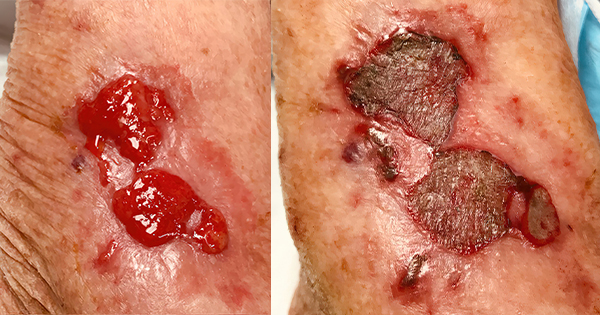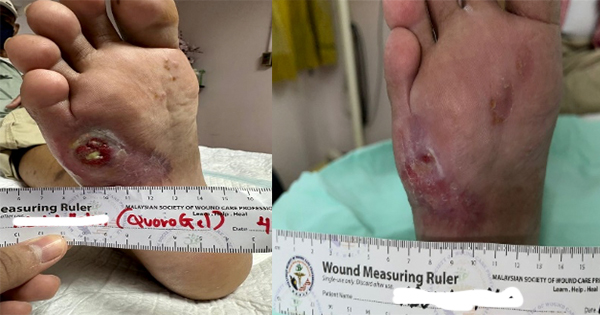Chronic wounds pose a significant clinical challenge, often exacerbated by malnutrition and systemic inflammation (Grada et al, 2022). The four stages of wound healing (haemostasis, inflammation, proliferation, remodelling) require intense energy and adequate nutrition. Timely identification of nutritional deficiencies is essential. In several studies, early nutrient supplementation has demonstrated benefits, including enhanced wound healing, reduced wound size and improvements in key biochemical markers. While standard wound care addresses local pathology, emerging evidence identifies the importance of treating the ‘whole patient’ (Ju et al, 2023), including nutritional status impact.
The TIMERS framework for wound bed preparation (Atkin et al, 2019) promotes a comprehensive, systemic approach to managing hard-to-heal wounds. Building on the original TIME model, TIMERS expands the focus as follows:
- Tissue removal.
- Infection and inflammation control.
- Moisture balance.
- Edge advancement.
- Regeneration and repair strategies.
- Social factors, such as nutrition, comorbidities, and overall patient wellbeing.
This holistic model highlights the importance of integrating nutritional interventions as a core component of wound healing. Evidence increasingly supports the role of targeted nutrition in enhancing tissue repair, reducing wound size and improving biochemical markers, making it an important consideration in clinical pathways and patient centred care.
Earlier pilot studies (Kam et al, 2019; Nair, 2019) reported that Epigran Protein — a fortified supplement high in amino acids, including arginine, glutamine and branched-chain amino acids (BCAAs), as well as edible bird’s nest (EBN) and micro nutrients — improved wound outcome. A subsequent study (Helmi et al, 2023) reported measurable biochemical markers associated with wound healing. Subjects demonstrated an improvement in albumin levels and a reduction in C-reactive protein (CRP) and erythrocyte sedimentation rate (ESR) levels.
Hypoalbuminemia has been linked to patients’ nutritional status and is occasionally used as a marker of malnutrition (Mirsaeidi
et al, 2018).
The primary focus of this study was on wound size reduction, albumin restoration and modulation of inflammatory biomarkers (CRP and ESR), reinforcing the role of nutritional and systemic interventions in wound healing outcomes.
Objective
The objective of this trial was to recruit 50 patients with chronic wounds and administer the nutritional supplement Epigran Protein over a 30-day period. The study aimed to evaluate whether this intervention would yield favourable outcomes, specifically in terms of wound healing progression and improvements in biochemical markers.
Methods
Subjects were recruited in a hospital wound unit, with inclusion criteria as follows:
- Patients: 50 chronic wound cases aged 18-80 years, any type of open wound persisting for over one month (>4 weeks). Inclusion criteria required oral intake capability and compliance with a weekly follow-up. (Exclusion criteria included those that could not consume liquid drinks without tube feed; were breastfeeding or pregnant.)
- Intervention: Epigran Protein (20g sachet), taken twice daily for 30 days, in addition to standard wound care protocol.
- Monitoring: wound size progression monitored weekly, and biochemical parameters (albumin, CRP, ESR) recorded bi-weekly, in accordance with the patient’s weekly follow up schedule.
Patients were recruited by the hospital wound unit staff during clinic days. Blood tests were carried out prior to trial commencement, at week 2, and at week 4. Wound size was registered weekly during the wound cleansing visit. Patient data was collected by the hospital, and hospital-level institutional approval was obtained.
Results
Of the 50 patients recruited, 20 had diabetic foot ulcers (DFUs), 14 had venous leg ulcers, five had necrotising fasciitis, and 11 had other wound types [Table 1].
After 30 days, the wound healing outcomes were clinically meaningful. Among the 50 patients, 42% achieved ≥50% wound size reduction, and 16% achieved full wound closure within 30 days.
The patients with DFUs showed the most favourable response, with 50% of DFU cases reaching ≥50% reduction, and 20% achieving full closure. This may reflect the metabolic sensitivity of DFUs to nutritional interventions.
The overall result [Figure 1] shows 21 patients with >50% size reduction and another 8 patients with full wound closure.
As shown in Figure 1, 58% (n=29) of chronic wound patients experienced a positive wound healing rate towards the end of the trial.
Number of patients with improved biomarkers after supplementation
Three key biomarkers (albumin, CRP and ESR) were tracked pre- and post-intervention in 50 patients. The number of patients with below-normal biomarkers was recorded and a comparison was undertaken at the end of the trial period.
Patients with below-normal albumin levels (n=26)
Among patients with baseline hypoalbuminemia (<35 g/l), 77% (20 out of 26) demonstrated an upward trend in serum albumin levels following 30 days of Epigran Protein supplementation. Notably, 62% of these individuals achieved a normalisation of albumin levels, with a mean increase of +5.4 g/l. [Figure 2].
This improvement suggests enhanced protein synthesis and systemic recovery, both of which are positively correlated with wound healing outcomes. The data reinforces the clinical relevance of targeted nutritional intervention in supporting tissue repair, and modulating inflammatory status in patients with chronic wounds.
Patients with high CRP levels (n=37)
Among patients presenting with elevated CRP levels, 81% (30 out of 37) demonstrated a reduction following 30 days of Epigran Protein supplementation [Figure 3]. Notably, 16% of these individuals achieved normalisation of CRP levels, indicating a measurable shift in systemic inflammatory status.
These findings suggest that targeted nutritional support may contribute to modulating inflammation, which is a critical factor in chronic wound healing. The observed reduction in CRP reinforces the potential role of supplementation in enhancing systemic recovery and improving wound outcomes.
Patients with high ESR levels (n=40)
Among patients presenting with elevated ESR levels, 76% (31 out of 40 patients) registered a lower level after 30 days of Epigran Protein supplementation [Figure 4]. Of these patients, 18% reverted to a normal range for ESR levels.
Clinical implications
These notable reductions in inflammatory markers (CRP, ESR) and improved albumin levels, correlated with wound size improvement. This enhances the hypothesis that the nutrient-dense formula (enriched with arginine, glutamine, BCAAs and EBN extract) could alter cellular repair and tissue regeneration, and provide an adjunct in the treatment of chronic wound cases.
CRP and ESR reductions in these inflammatory markers were observed in over 75% of affected patients, indicating a dampening of systemic inflammation. These improvements were not isolated; they correlated with wound size reduction, suggesting a synergistic effect between nutritional support and tissue repair.
These shifts suggest that a nutritional supplement with anti-inflammatory components — particularly glutamine and EBN — may modulate immune responses and promote a pro-healing environment. The inclusion of antioxidants and micronutrients likely contributed to oxidative stress reduction, further supporting tissue repair.
Conclusion
The link between biomarker normalisation and wound size reduction suggests a possible role for nutritional supplementation as a valuable adjunct to wound care. Reducing inflammation and correcting protein deficiency could, therefore, promote timely wound healing (Nair, 2019).
In this 50-patient trial, the addition of Epigran Protein to standard wound care protocols resulted in improved serum albumin levels, reduced inflammatory markers (CRP and ESR) and enhanced tissue repair. These outcomes reinforce the therapeutic value of targeted nutritional supplementation in chronic wound management.
The findings are consistent with earlier pilot studies (Nair, 2019), which similarly demonstrated positive shifts in biochemical markers and wound size reduction following Epigran Protein administration. Collectively, the data suggests broader clinical potential for integrating nutrition based interventions into wound healing pathways, particularly for patients with systemic deficits or delayed healing trajectories.
While the findings from this 50-patient trial are encouraging, they should be interpreted with a consideration for study design limitations. The observed improvements in wound size and biomarker profiles suggest that nutritional supplement may offer a supportive role in chronic wound management when used alongside standard care.
These results align with prior pilot studies and reinforce the potential value of integrating targeted nutritional strategies into holistic wound care frameworks. Further randomised controlled trials are warranted, to validate these outcomes and explore long-term benefits






